Alphacrucis College EXP 201: Reflecting on Mentoring Experience
VerifiedAdded on 2023/06/10
|6
|1346
|405
Report
AI Summary
This report reflects on the student's professional practice experience, focusing on the purpose and nature of mentoring relationships within a hospitality setting. It critically engages with course concepts, readings, and ethical parameters, discussing the strengths and weaknesses of the mentoring process. The student outlines their own mentoring experience, highlighting areas of self-improvement and the effectiveness of the mentoring received. The logbook entries detail daily tasks, including interactions with staff and customers, use of ordering machines, and learning about workplace hygiene. The report concludes with a reflection on the mentor's role in facilitating the student's understanding of the restaurant business and the development of essential skills in communication, customer service, and operational tasks.
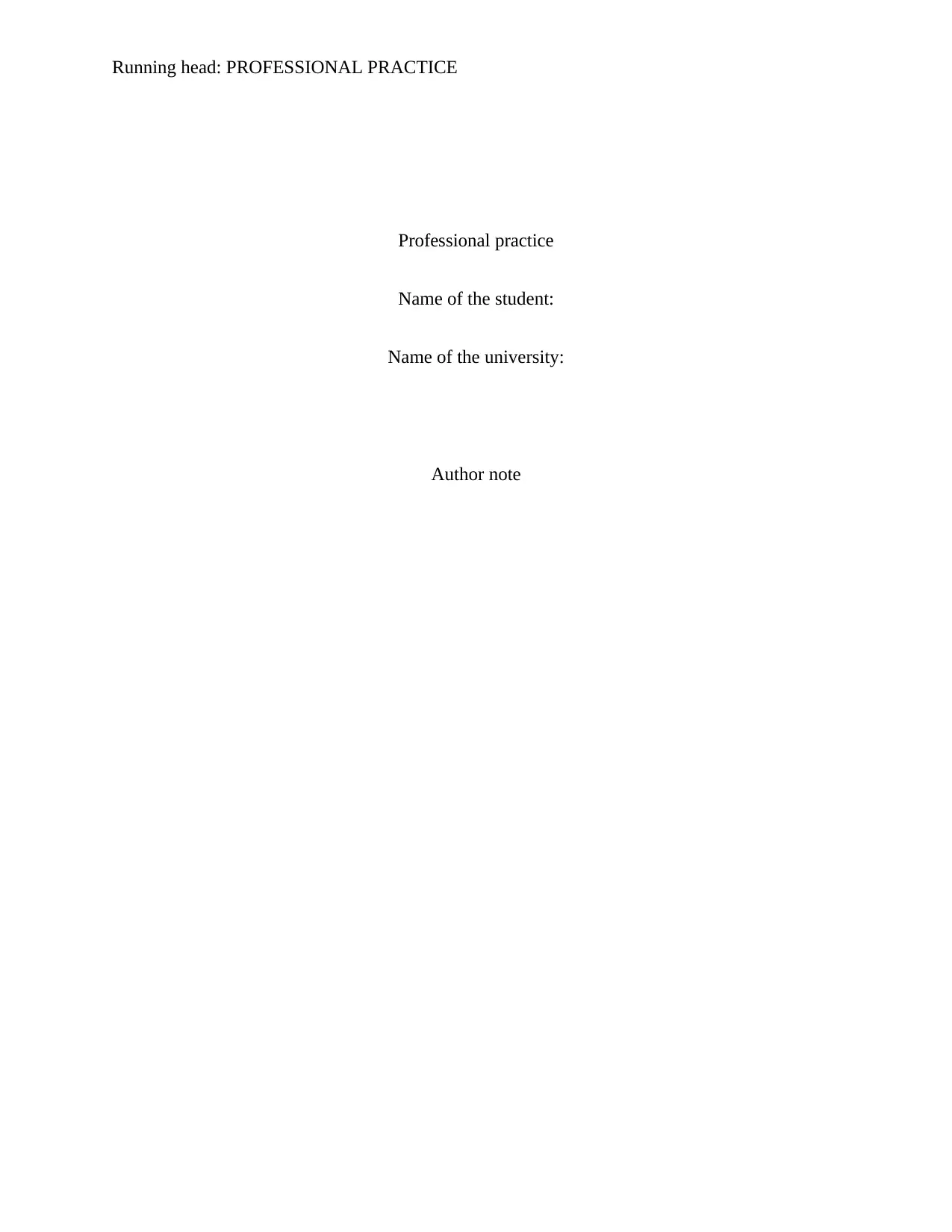
Running head: PROFESSIONAL PRACTICE
Professional practice
Name of the student:
Name of the university:
Author note
Professional practice
Name of the student:
Name of the university:
Author note
Paraphrase This Document
Need a fresh take? Get an instant paraphrase of this document with our AI Paraphraser
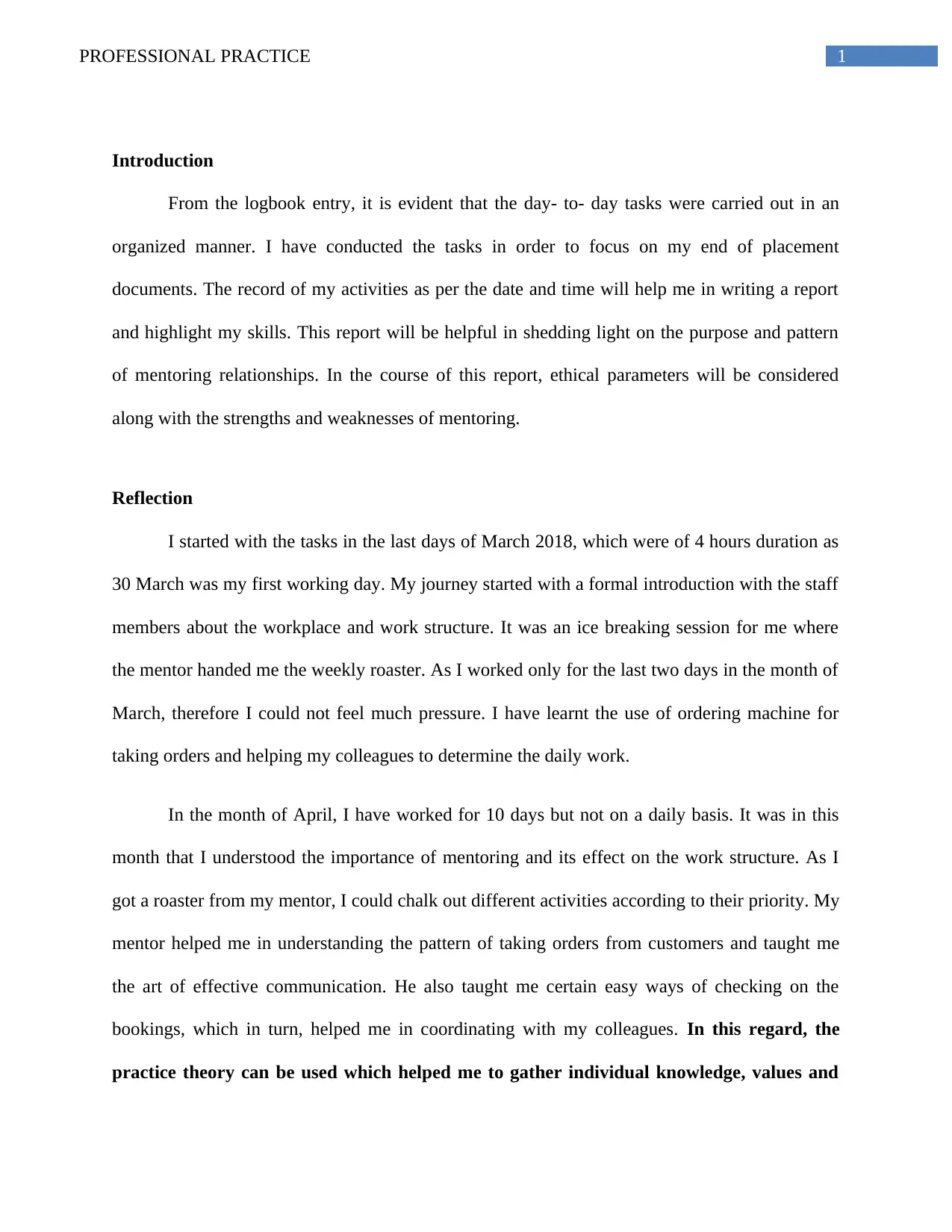
1PROFESSIONAL PRACTICE
Introduction
From the logbook entry, it is evident that the day- to- day tasks were carried out in an
organized manner. I have conducted the tasks in order to focus on my end of placement
documents. The record of my activities as per the date and time will help me in writing a report
and highlight my skills. This report will be helpful in shedding light on the purpose and pattern
of mentoring relationships. In the course of this report, ethical parameters will be considered
along with the strengths and weaknesses of mentoring.
Reflection
I started with the tasks in the last days of March 2018, which were of 4 hours duration as
30 March was my first working day. My journey started with a formal introduction with the staff
members about the workplace and work structure. It was an ice breaking session for me where
the mentor handed me the weekly roaster. As I worked only for the last two days in the month of
March, therefore I could not feel much pressure. I have learnt the use of ordering machine for
taking orders and helping my colleagues to determine the daily work.
In the month of April, I have worked for 10 days but not on a daily basis. It was in this
month that I understood the importance of mentoring and its effect on the work structure. As I
got a roaster from my mentor, I could chalk out different activities according to their priority. My
mentor helped me in understanding the pattern of taking orders from customers and taught me
the art of effective communication. He also taught me certain easy ways of checking on the
bookings, which in turn, helped me in coordinating with my colleagues. In this regard, the
practice theory can be used which helped me to gather individual knowledge, values and
Introduction
From the logbook entry, it is evident that the day- to- day tasks were carried out in an
organized manner. I have conducted the tasks in order to focus on my end of placement
documents. The record of my activities as per the date and time will help me in writing a report
and highlight my skills. This report will be helpful in shedding light on the purpose and pattern
of mentoring relationships. In the course of this report, ethical parameters will be considered
along with the strengths and weaknesses of mentoring.
Reflection
I started with the tasks in the last days of March 2018, which were of 4 hours duration as
30 March was my first working day. My journey started with a formal introduction with the staff
members about the workplace and work structure. It was an ice breaking session for me where
the mentor handed me the weekly roaster. As I worked only for the last two days in the month of
March, therefore I could not feel much pressure. I have learnt the use of ordering machine for
taking orders and helping my colleagues to determine the daily work.
In the month of April, I have worked for 10 days but not on a daily basis. It was in this
month that I understood the importance of mentoring and its effect on the work structure. As I
got a roaster from my mentor, I could chalk out different activities according to their priority. My
mentor helped me in understanding the pattern of taking orders from customers and taught me
the art of effective communication. He also taught me certain easy ways of checking on the
bookings, which in turn, helped me in coordinating with my colleagues. In this regard, the
practice theory can be used which helped me to gather individual knowledge, values and
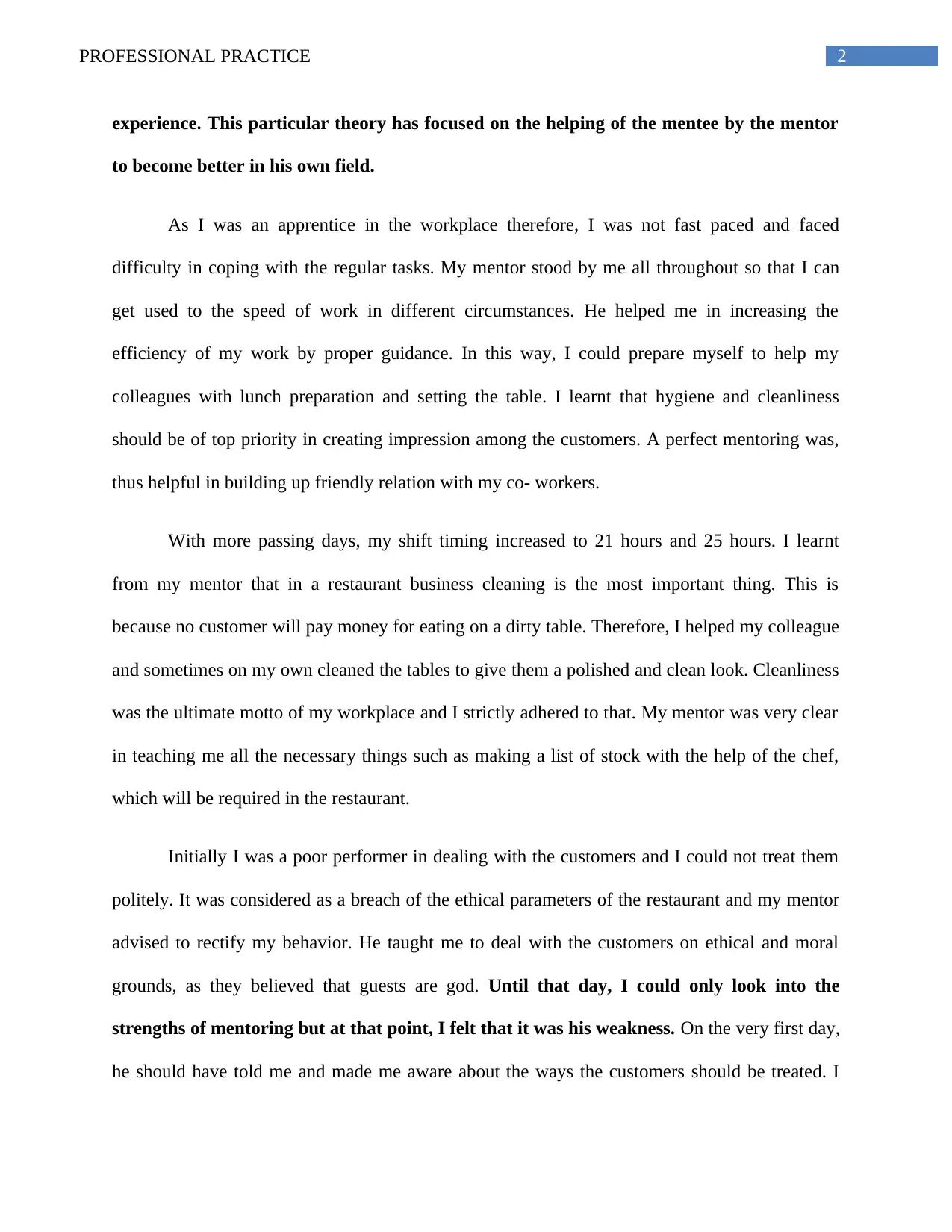
2PROFESSIONAL PRACTICE
experience. This particular theory has focused on the helping of the mentee by the mentor
to become better in his own field.
As I was an apprentice in the workplace therefore, I was not fast paced and faced
difficulty in coping with the regular tasks. My mentor stood by me all throughout so that I can
get used to the speed of work in different circumstances. He helped me in increasing the
efficiency of my work by proper guidance. In this way, I could prepare myself to help my
colleagues with lunch preparation and setting the table. I learnt that hygiene and cleanliness
should be of top priority in creating impression among the customers. A perfect mentoring was,
thus helpful in building up friendly relation with my co- workers.
With more passing days, my shift timing increased to 21 hours and 25 hours. I learnt
from my mentor that in a restaurant business cleaning is the most important thing. This is
because no customer will pay money for eating on a dirty table. Therefore, I helped my colleague
and sometimes on my own cleaned the tables to give them a polished and clean look. Cleanliness
was the ultimate motto of my workplace and I strictly adhered to that. My mentor was very clear
in teaching me all the necessary things such as making a list of stock with the help of the chef,
which will be required in the restaurant.
Initially I was a poor performer in dealing with the customers and I could not treat them
politely. It was considered as a breach of the ethical parameters of the restaurant and my mentor
advised to rectify my behavior. He taught me to deal with the customers on ethical and moral
grounds, as they believed that guests are god. Until that day, I could only look into the
strengths of mentoring but at that point, I felt that it was his weakness. On the very first day,
he should have told me and made me aware about the ways the customers should be treated. I
experience. This particular theory has focused on the helping of the mentee by the mentor
to become better in his own field.
As I was an apprentice in the workplace therefore, I was not fast paced and faced
difficulty in coping with the regular tasks. My mentor stood by me all throughout so that I can
get used to the speed of work in different circumstances. He helped me in increasing the
efficiency of my work by proper guidance. In this way, I could prepare myself to help my
colleagues with lunch preparation and setting the table. I learnt that hygiene and cleanliness
should be of top priority in creating impression among the customers. A perfect mentoring was,
thus helpful in building up friendly relation with my co- workers.
With more passing days, my shift timing increased to 21 hours and 25 hours. I learnt
from my mentor that in a restaurant business cleaning is the most important thing. This is
because no customer will pay money for eating on a dirty table. Therefore, I helped my colleague
and sometimes on my own cleaned the tables to give them a polished and clean look. Cleanliness
was the ultimate motto of my workplace and I strictly adhered to that. My mentor was very clear
in teaching me all the necessary things such as making a list of stock with the help of the chef,
which will be required in the restaurant.
Initially I was a poor performer in dealing with the customers and I could not treat them
politely. It was considered as a breach of the ethical parameters of the restaurant and my mentor
advised to rectify my behavior. He taught me to deal with the customers on ethical and moral
grounds, as they believed that guests are god. Until that day, I could only look into the
strengths of mentoring but at that point, I felt that it was his weakness. On the very first day,
he should have told me and made me aware about the ways the customers should be treated. I
⊘ This is a preview!⊘
Do you want full access?
Subscribe today to unlock all pages.

Trusted by 1+ million students worldwide
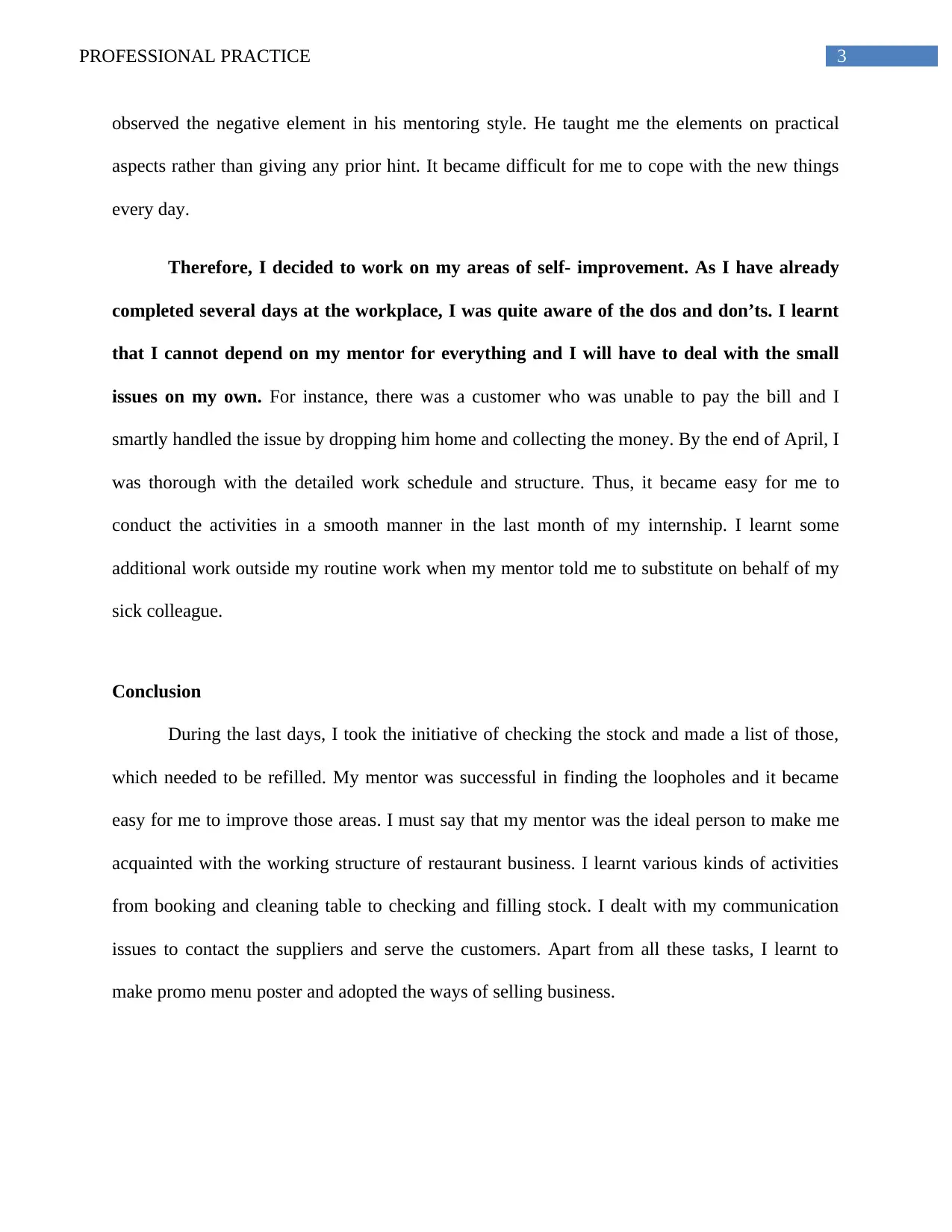
3PROFESSIONAL PRACTICE
observed the negative element in his mentoring style. He taught me the elements on practical
aspects rather than giving any prior hint. It became difficult for me to cope with the new things
every day.
Therefore, I decided to work on my areas of self- improvement. As I have already
completed several days at the workplace, I was quite aware of the dos and don’ts. I learnt
that I cannot depend on my mentor for everything and I will have to deal with the small
issues on my own. For instance, there was a customer who was unable to pay the bill and I
smartly handled the issue by dropping him home and collecting the money. By the end of April, I
was thorough with the detailed work schedule and structure. Thus, it became easy for me to
conduct the activities in a smooth manner in the last month of my internship. I learnt some
additional work outside my routine work when my mentor told me to substitute on behalf of my
sick colleague.
Conclusion
During the last days, I took the initiative of checking the stock and made a list of those,
which needed to be refilled. My mentor was successful in finding the loopholes and it became
easy for me to improve those areas. I must say that my mentor was the ideal person to make me
acquainted with the working structure of restaurant business. I learnt various kinds of activities
from booking and cleaning table to checking and filling stock. I dealt with my communication
issues to contact the suppliers and serve the customers. Apart from all these tasks, I learnt to
make promo menu poster and adopted the ways of selling business.
observed the negative element in his mentoring style. He taught me the elements on practical
aspects rather than giving any prior hint. It became difficult for me to cope with the new things
every day.
Therefore, I decided to work on my areas of self- improvement. As I have already
completed several days at the workplace, I was quite aware of the dos and don’ts. I learnt
that I cannot depend on my mentor for everything and I will have to deal with the small
issues on my own. For instance, there was a customer who was unable to pay the bill and I
smartly handled the issue by dropping him home and collecting the money. By the end of April, I
was thorough with the detailed work schedule and structure. Thus, it became easy for me to
conduct the activities in a smooth manner in the last month of my internship. I learnt some
additional work outside my routine work when my mentor told me to substitute on behalf of my
sick colleague.
Conclusion
During the last days, I took the initiative of checking the stock and made a list of those,
which needed to be refilled. My mentor was successful in finding the loopholes and it became
easy for me to improve those areas. I must say that my mentor was the ideal person to make me
acquainted with the working structure of restaurant business. I learnt various kinds of activities
from booking and cleaning table to checking and filling stock. I dealt with my communication
issues to contact the suppliers and serve the customers. Apart from all these tasks, I learnt to
make promo menu poster and adopted the ways of selling business.
Paraphrase This Document
Need a fresh take? Get an instant paraphrase of this document with our AI Paraphraser
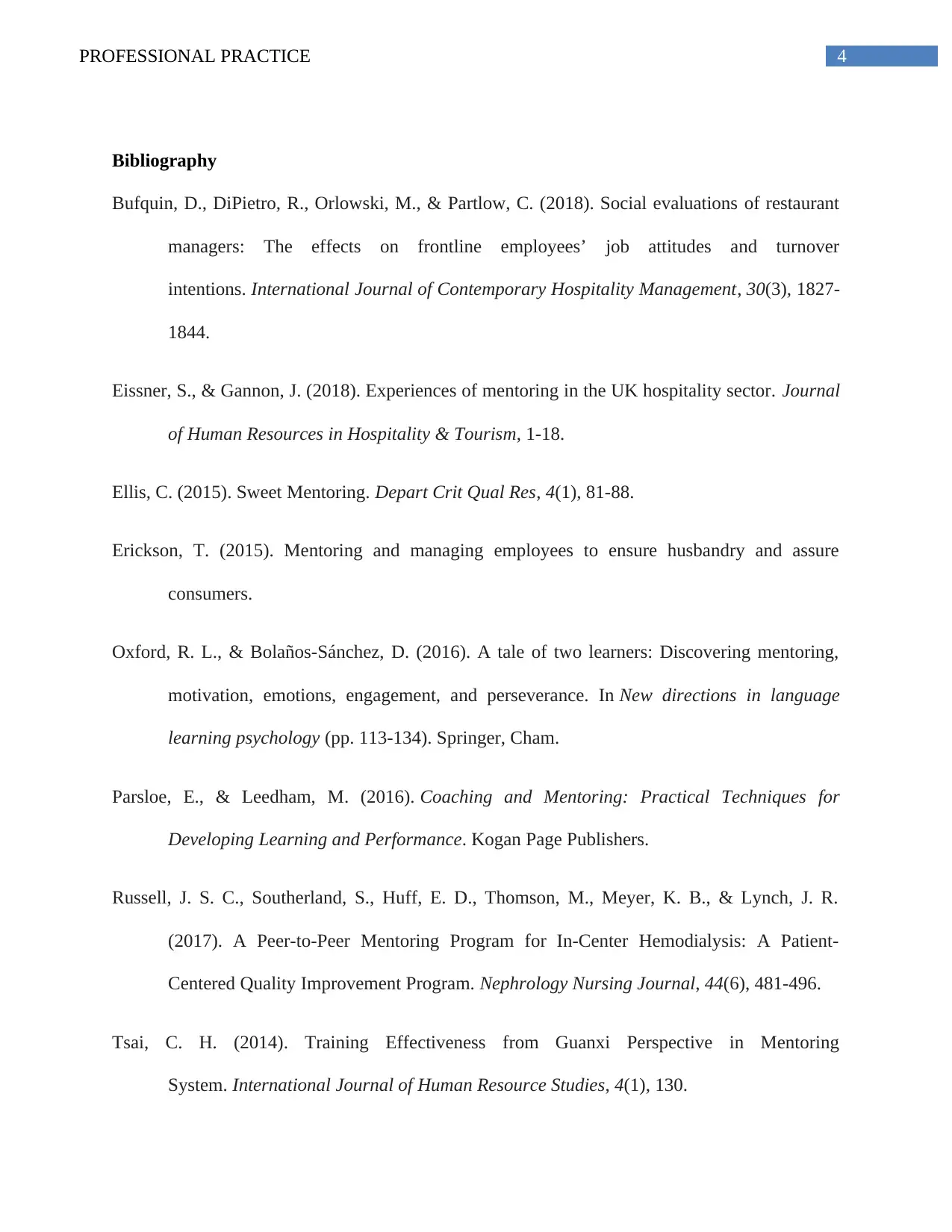
4PROFESSIONAL PRACTICE
Bibliography
Bufquin, D., DiPietro, R., Orlowski, M., & Partlow, C. (2018). Social evaluations of restaurant
managers: The effects on frontline employees’ job attitudes and turnover
intentions. International Journal of Contemporary Hospitality Management, 30(3), 1827-
1844.
Eissner, S., & Gannon, J. (2018). Experiences of mentoring in the UK hospitality sector. Journal
of Human Resources in Hospitality & Tourism, 1-18.
Ellis, C. (2015). Sweet Mentoring. Depart Crit Qual Res, 4(1), 81-88.
Erickson, T. (2015). Mentoring and managing employees to ensure husbandry and assure
consumers.
Oxford, R. L., & Bolaños-Sánchez, D. (2016). A tale of two learners: Discovering mentoring,
motivation, emotions, engagement, and perseverance. In New directions in language
learning psychology (pp. 113-134). Springer, Cham.
Parsloe, E., & Leedham, M. (2016). Coaching and Mentoring: Practical Techniques for
Developing Learning and Performance. Kogan Page Publishers.
Russell, J. S. C., Southerland, S., Huff, E. D., Thomson, M., Meyer, K. B., & Lynch, J. R.
(2017). A Peer-to-Peer Mentoring Program for In-Center Hemodialysis: A Patient-
Centered Quality Improvement Program. Nephrology Nursing Journal, 44(6), 481-496.
Tsai, C. H. (2014). Training Effectiveness from Guanxi Perspective in Mentoring
System. International Journal of Human Resource Studies, 4(1), 130.
Bibliography
Bufquin, D., DiPietro, R., Orlowski, M., & Partlow, C. (2018). Social evaluations of restaurant
managers: The effects on frontline employees’ job attitudes and turnover
intentions. International Journal of Contemporary Hospitality Management, 30(3), 1827-
1844.
Eissner, S., & Gannon, J. (2018). Experiences of mentoring in the UK hospitality sector. Journal
of Human Resources in Hospitality & Tourism, 1-18.
Ellis, C. (2015). Sweet Mentoring. Depart Crit Qual Res, 4(1), 81-88.
Erickson, T. (2015). Mentoring and managing employees to ensure husbandry and assure
consumers.
Oxford, R. L., & Bolaños-Sánchez, D. (2016). A tale of two learners: Discovering mentoring,
motivation, emotions, engagement, and perseverance. In New directions in language
learning psychology (pp. 113-134). Springer, Cham.
Parsloe, E., & Leedham, M. (2016). Coaching and Mentoring: Practical Techniques for
Developing Learning and Performance. Kogan Page Publishers.
Russell, J. S. C., Southerland, S., Huff, E. D., Thomson, M., Meyer, K. B., & Lynch, J. R.
(2017). A Peer-to-Peer Mentoring Program for In-Center Hemodialysis: A Patient-
Centered Quality Improvement Program. Nephrology Nursing Journal, 44(6), 481-496.
Tsai, C. H. (2014). Training Effectiveness from Guanxi Perspective in Mentoring
System. International Journal of Human Resource Studies, 4(1), 130.
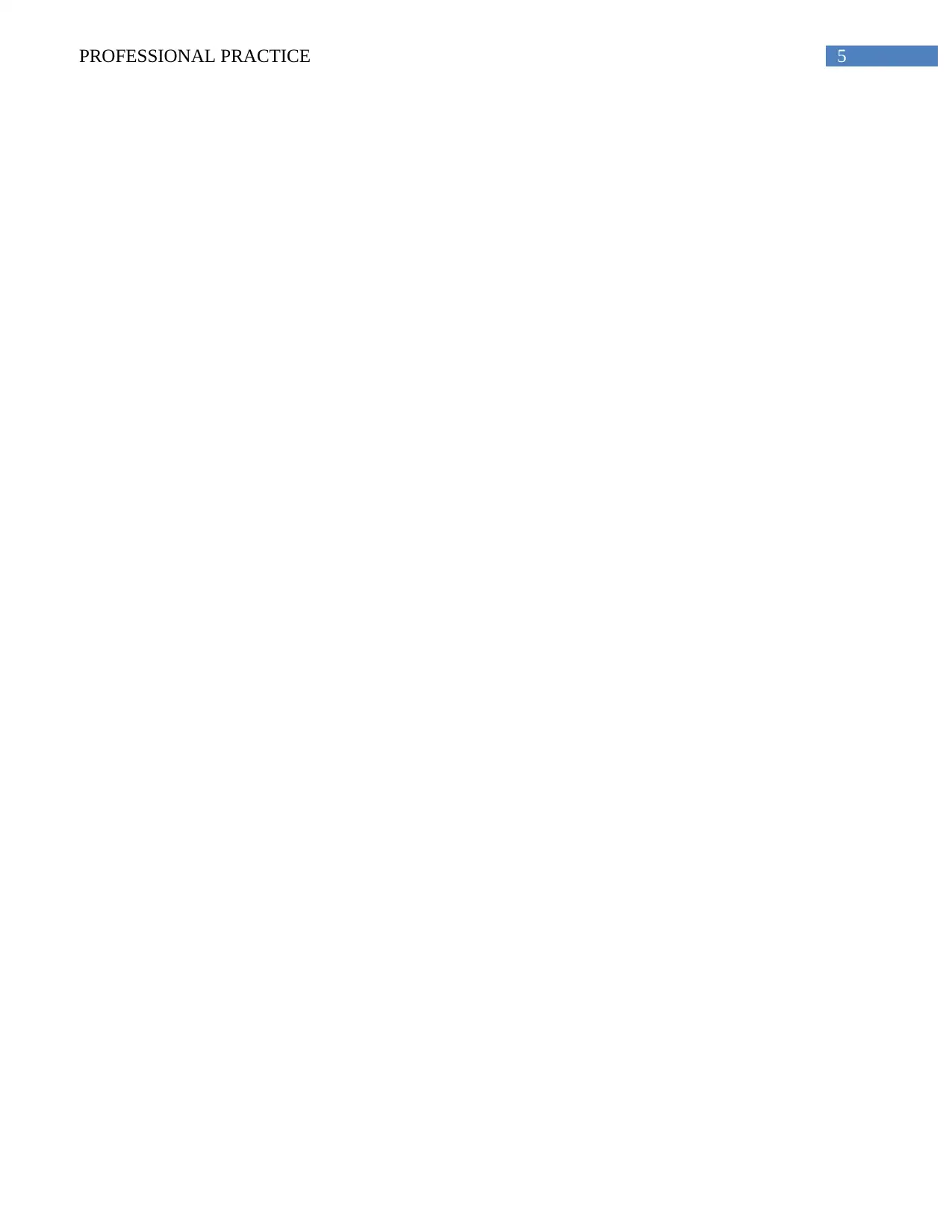
5PROFESSIONAL PRACTICE
⊘ This is a preview!⊘
Do you want full access?
Subscribe today to unlock all pages.

Trusted by 1+ million students worldwide
1 out of 6
Related Documents
Your All-in-One AI-Powered Toolkit for Academic Success.
+13062052269
info@desklib.com
Available 24*7 on WhatsApp / Email
![[object Object]](/_next/static/media/star-bottom.7253800d.svg)
Unlock your academic potential
Copyright © 2020–2026 A2Z Services. All Rights Reserved. Developed and managed by ZUCOL.



